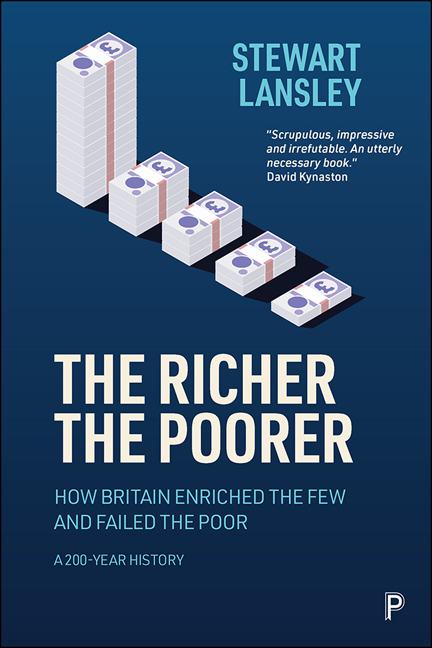Book contents
- Frontmatter
- Miscellaneous Frontmatter
- Dedication
- Epigraph
- Contents
- List of figures
- Preface and acknowledgements
- Introduction: Knighthoods for the rich, penalties for the poor
- PART I 1800–1939
- PART II 1940–59
- PART III 1960–79
- PART IV 1980–96
- PART V 1997–2010
- PART VI 2011–20
- Afterword: COVID-19 and ‘the polo season’
- Notes
- Index
23 - Divide and rule: playing politics with poverty
Published online by Cambridge University Press: 13 May 2022
- Frontmatter
- Miscellaneous Frontmatter
- Dedication
- Epigraph
- Contents
- List of figures
- Preface and acknowledgements
- Introduction: Knighthoods for the rich, penalties for the poor
- PART I 1800–1939
- PART II 1940–59
- PART III 1960–79
- PART IV 1980–96
- PART V 1997–2010
- PART VI 2011–20
- Afterword: COVID-19 and ‘the polo season’
- Notes
- Index
Summary
In its dying days, the Labour government moved to make the earlier pledges on poverty legally binding. The 2010 Child Poverty Act set four targets to be met within a decade. The Act was an unambiguous statement of the societal obligation to tackle poverty and a statutory recognition that poverty is relative.
Remarkably, given the history of political division over the question of poverty, the 2010 Act was passed with all-party support. In opposition, the Conservative Party leader David Cameron had declared that tackling relative poverty would be a priority in government. ‘The Conservative Party recognises, will measure and will act on relative poverty’. This was serious revisionism. Determined to project a more compassionate image, the Conservative Party, in a striking shift, had signed up to the idea that Britain's record on poverty needed to be greatly improved.
Poverty plus a pound
In the event, the consensus barely lasted a week. Signs of what was to follow came during the 2010 election campaign when the Conservatives launched a poster with the caption: ‘Let's cut benefits for those who refuse to work.’ Almost from the moment Cameron formed a coalition with the Liberal Democrats, ‘compassionate Conservatism’ was dumped in a way which collided head on with the commitments of the 2010 Act.
In place of the earlier pledges, and a sign of the coarsening of the poverty debate, a number of quite different themes emerged. More money, it was claimed, was not an effective way of fighting poverty. The work and pensions secretary Iain Duncan Smith constantly dismissed what he called the ‘poverty plus a pound’ approach aimed merely at ‘lifting income over an arbitrary line’. The government also sought to replace official measures of poverty with ones that would, at a stroke, greatly reduce the official count. This involved redefining the causes of poverty away from broadly societal and structural explanations –such as low wages and high rents –to individual ones, such as family breakdown and bad parenting. As Duncan Smith put it, ‘The nature of the life you lead and the choices that you make have a significant bearing on whether you live in poverty.
- Type
- Chapter
- Information
- The Richer, the PoorerHow Britain Enriched the Few and Failed the Poor: A 200-Year History, pp. 209 - 215Publisher: Bristol University PressPrint publication year: 2021



